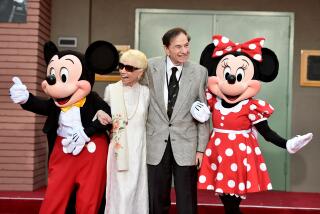‘Mr. Music’ plans encore
- Share via
BOCA RATON, Fla. — Cradling a Cosmopolitan in his plump right hand, Don Kirshner is reminiscing about his former life as a pop music mogul and getting a little wistful. All the hits, all the bands, all the favors he did for up-and-comers. But here he sits, at the best table in this swanky restaurant, pretty much forgotten.
Slighted is a better word for it, or that’s the way he feels, anyway. Yes, the maitre d’ and the waiters here know him. And the other retirees in the nearby plush gated community where he lives will pat him on the back and say things like, “This guy is spectacular. Spectacular!”
But the rest of the world?
“I’m a military secret,” he rasps in a blustery Bronx accent. “People don’t know if I’m alive or dead! My body of work is as big as anyone’s, and nobody knows the half of it.”
The half you know, even if you’ve never heard Kirshner’s name, is the music. Back when rock was in diapers, Kirshner hired a group of now legendary young songwriters and coaxed from them hit after hit, including “Up on the Roof,” “Breaking Up Is Hard to Do,” “Will You Love Me Tomorrow” and the most played radio song of all time, “You’ve Lost That Loving Feeling.” In about four years, he and his team composed and published dozens of hits, turning the company he co-founded into the center of the pop universe.
Kirshner stayed in the game until the early 1980s, as the unforgettably monotone host of a TV show, “Don Kirshner’s Rock Concert.” Its nine-year run gave U.S. audiences a first glimpse at acts such as Lynyrd Skynyrd, Sly & the Family Stone and Devo.
Once MTV stampeded the airwaves, Kirshner retired. But at 70, he’s ready to claim what he believes is owed him, which is a simple modicum of respect, thank you very much. The sorest spot is the Rock and Roll Hall of Fame, which has yet to induct him in its “non-performer” category and, worse, keeps inducting pishers like Jann Wenner, editor of Rolling Stone magazine. Why is Wenner in if he’s not?
“I’d like to know. I don’t want to sound like sour grapes, but I believe I should have been one of the first three or first five inducted. Seriously. I mean, they’ve got people in there that I trained, and I’m not in?”
Kirshner is through believing the record will set itself straight. He retired more than 20 years ago, and it’s been more than 15 years, by his estimate, since he sat for an interview. But he’s fed up. He’s going public with his grievances, and, more important, he’s going back to work.
Kirshner has spent much of the last three years plotting a comeback. His ambition is nothing less than a global entertainment company, and to build it he’s spending 10 hours a day listening to new bands, negotiating with potential partners. A radio-Internet show is in the works that will reprise his role as the “man with the golden ear,” as Time magazine once called him, and he plans to pitch a new software technology to record labels.
“People are going to wonder why a guy who is 70 years old isn’t in the South of France, contemplating his navel,” Kirshner says, chuckling. “Well, I feel sharper now than ever. More mature, bigger Rolodex.”
He’s been married 46 years, and he moved to Boca Raton from New Jersey four years ago to be closer to his daughter and grandchildren. He’s thicker around the middle now, and lumbers a bit when he walks. But he’s still that odd combination of scenester and square, who drops Yiddish into tales about Ozzy Osbourne.
By 18, he’d written and recorded a song that went nowhere, but a couple of years later a friend introduced him to a supremely confident young man named Walden Robert Cassotto, who told Kirshner he was going to be a star.
“I’ll never forget it,” Kirshner says. “He was wearing a stained muffler. I said to him, ‘Show me what you’ve got.’ ”
Cassotto, soon to be famous as Bobby Darin, played a few songs, and Kirshner was impressed. They did jingles together, Darin writing the music, Kirshner the lyrics. There was never any question, though, who had the musical talent.
“Bobby was everything I couldn’t be,” Kirshner says. “He was an actor; he could impersonate people; he could sing, read music. He had beyond-incredible talent. I lived through him.”
By 1959, Darin had the No. 1 U.S. single, “Mack the Knife.” A year later, he was costarring in a movie with “Gidget” sweetheart Sandra Dee, and they married in Kirshner’s New Jersey apartment.
As Darin caught on and made a fortune, his and Kirshner’s professional partnership dissolved. But Kirshner realized the people writing the songs were mostly grown-ups who were only guessing at what teenagers would want to hear. So he formed Aldon Music with a mentor, musician Al Nevins, in an office on Broadway, the heart of a kind of one-stop song publishing factory. You could write a tune, tape it, then sell it to the guy who represented Fats Domino, all in the same afternoon.
While most labels were releasing forgettable dreck like “Dungaree Doll,” Kirshner signed up young, unknown talent such as Neil Diamond and the husband-and-wife team of Barry Mann and Cynthia Weil, who wrote “Walkin’ in the Rain,” recorded by the Ronettes. Such songs nailed the drama of teenage love in all its sobbing glory. Kirshner maximized production by putting teams of writers in quarters close enough to hear what everyone else was doing, which made it competitive. The Beatles covered an Aldon song, “Chains,” written by Carole King and her husband, Gerry Goffin, on their first album.
“Donny was Mr. Music in the early ‘60s and a very lovely guy, like your favorite uncle,” says Ron Dante, an Aldon songwriter. “I met him when I was like 16 or 17, and when he told me he wanted to sign me to a publishing deal, I almost fell off my chair.”
By 1963, Kirshner and Nevins were ready to sell their catalog of copyrights. Columbia Pictures was willing to pay. Kirshner’s half alone amounted to more than $9 million in today’s dollars; moreover, Columbia would install Kirshner as musical director of Screen Gems, a division of the company that produced television and films.
It felt like good timing, especially when the teenage pop market began to decline a couple of years later with the arrival of singer-songwriters such as Bob Dylan. But Vanity Fair recently estimated the value of those copyrights at $1 billion. And the deal with Screen Gems ended in a fiasco.
In 1965, Kirshner asked for, and received, one-third of all the musical profits from a made-for-TV band being formed by Columbia. Kirshner had tracks written for the “Prefab Four” by people like Neil Diamond (“I’m a Believer”) and Goffin and King (“Pleasant Valley Sunday,” inspired by the couple’s drive to Kirshner’s house in the suburbs).
The Monkees had two No. 1 albums, but its members began to resent the fluffy pop songs they were asked to sing. Too, Kirshner was constantly celebrated as the musical puppeteer behind the group, which ticked off both the Monkees and the Screen Gems executives. Kirshner says the dispute was about jealousy over the credit and the pay he was getting.
The end came soon after he summoned the Monkees to present them with a huge royalty check, plus a song he was sure would be their next hit. By then the group was determined to write its own material, and guitarist Michael Nesmith punched a hole in Kirshner’s wall to emphasize the point.
Kirshner was fired. He sued for breach of contract and won what he described as a huge out-of-court settlement.
And the song he’d been pushing on the Monkees? He started a new band, of cartoon characters based on a comic book he’d seen his son reading. “The Archies” became a hit TV show, and “Sugar, Sugar” sold more than 10 million copies.
“I said, ‘Screw the Monkees. I want a band that won’t talk back,’ ” Kirshner says. “It was the No. 1 song of 1969. It outsold the Rolling Stones.”
There were more than 180 episodes of “Don Kirshner’s Rock Concert,” starting with the Rolling Stones in 1973 and ending in 1982. It went off the air the year MTV arrived, and Kirshner quit the business.
Then he went a little crazy.
He bought a house in New Vernon, N.J. When he and his wife arrived at their home-to-be the next day, a wrecking crew promptly razed the building.
He set about building his own Xanadu: 25,000 square feet, with a disco, a pool with underwater speakers, two tennis courts, a full-size basketball court. But the place seemed cursed. Soon after they moved in, Kirshner’s father took ill, his father-in-law passed away, and his son came down with hepatitis. Kirshner became paranoid. He fretted over a threatening, anti-Semitic letter he’d received years earlier, and hired guards for his home. In 1982 he sold the place.
Four years ago, Kirshner met a local businessman named Greg Paige, who began advising him on investments and proposed that he return to the music business. The two settled on the notion of a TV-style network designed for the Internet. The programming will be a combination of chat show and “American Idol,” with Kirshner catching up with stars and auditioning unknowns, to be aired on the radio and the Web. Shares in Kirshner International, the public company he and Paige founded, currently trade at about 8 cents on the over-the-counter market.
Still, the Rock and Roll Hall of Fame remains a sore spot. Kirshner’s house includes a glass-enclosed diorama sent by a fan that tells the story of Kirshner’s life -- about 4 feet wide and a foot or so high, loaded with photos of Darin and the Monkees and King. For the time being, it will have to do.
More to Read
The biggest entertainment stories
Get our big stories about Hollywood, film, television, music, arts, culture and more right in your inbox as soon as they publish.
You may occasionally receive promotional content from the Los Angeles Times.










